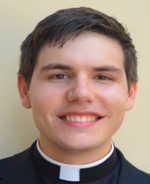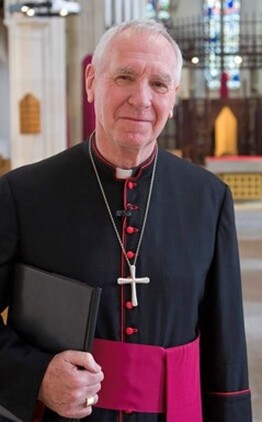Holy Orders is the sacrament through which the mission entrusted by Christ to his apostles continues to be exercised in the Church until the end of time: thus it is the sacrament of apostolic ministry. It includes three degrees: episcopate, presbyterate, and diaconate.
Vocations newsletter
The Diocesan vocations team has recently launched a digital newsletter to keep enquirers and the parishes informed about our work, including our vocations events hosted throughout the Diocese. If you would like to find out more and read about some of the young men currently in formation in the Diocese, please subscribe to the mailing list by visiting https://priesthoodplymouth.co.uk/
The Diocesan vocations team has recently launched a digital newsletter to keep enquirers and the parishes informed about our work, including our vocations events hosted throughout the Diocese. If you would like to find out more and read about some of the young men currently in formation in the Diocese, please subscribe to the mailing list by visiting https://priesthoodplymouth.co.uk/
CATHOLIC YOUTH MINISTRY INTERNSHIPS
Castlerigg Manor (The Lancaster Diocese Retreat Centre) is looking for young Catholics aged 18-25 to join their Youth Ministry Internship Programme. The scheme gives participants wide ranging experience, skills, training, and qualifications as well as the opportunity to work with a fantastic team based in the English Lake District. For more information contact [email protected]
Ordination is the sacramental ceremony in which a man becomes a deacon, priest, or bishop and enabled to minister in Christ's name and that of the Church. There are three ordinations in the Sacrament of Holy Orders: diaconate; priesthood; and episcopal. The ordination ceremony includes various rituals, rich in meaning and history, e.g., prostration, laying on of hands, anointing of hands, giving of the chalice and paten, sign of peace, but the essential rite of the sacrament, i.e., when it takes place, is the laying on of hands and prayer of consecration. This is an ancient tradition in the Church, mentioned in the Bible. Only a bishop can ordain a priest because he shares in the ministry of Jesus passed down through the apostles. When the ordaining bishop and the other priests participate in the laying on of hands they are actually invoking the Holy Spirit to come down upon the one to be ordained, giving him a sacred character and setting him apart for the designated ministry.
You may wonder why the ordinand (or the soon-to-be priest) lies in the prostrate position during the ordination... this is because it symbolizes his unworthiness for the office to be assumed and his dependence upon God and the prayers of the Christian community.
After the newly ordained priest receives the stole and the chasuble (these are vestments which pertain to his office and have symbolic meaning) which both have symbolic meanings: the stole symbolizes the authority and responsibility to serve in imitation of Christ. It reflects the line from Scripture: “For my yoke is easy and my burden light.” (Matthew 11:30) The chasuble is the principle garment of the priest celebrating the Eucharist and is the outermost vestment.
Anointing of the hands signifies anointing with oil stems from the Old Testament and indicates that someone or something is being set apart for a sacred task or duty. The anointing of the hands signifies that the hands of the newly ordained priest are being prepared for the sacred duties and vessels which will be part of the priestly ministry, for example, offering the bread and the wine, anointing the sick and blessing people. The bishop says as he anoints the hands: “The Father anointed our Lord Jesus Christ through the power of the Holy Spirit. May Jesus preserve you to sanctify the Christian people and to offer sacrifice to God.”
The ordaining bishop hands the ordinand a chalice and paten because the Eucharist is at the heart of the priesthood and this ritual highlights the importance of celebrating the Eucharist in the life of the priest and its meaning, as seen in the words which are spoken by the bishop: “Accept from the holy people of God the gifts to be offered to him. Know what you are doing, and imitate the mystery you celebrate; model your life on the mystery of the Lord’s cross.”
When a young (or older) man decides to become a priest, he has to engage in a challenging program of priestly formation which lasts from five to thirteen years, depending upon his background and the seminary he attends. There are three levels of seminary: high school; college/pre-theology; and theology. Seminaries address four types of formation: human, spiritual, academic (intellectual) and pastoral. In addition to the academic course work, seminarians participate in a full schedule of spiritual activities, e.g., daily mass, Liturgy of the Hours (Morning Prayer, Evening Prayer), and spiritual direction and retreats. At each level of seminary training, the seminarian prepares for future pastoral ministry in various settings, such as schools, religious education programs, hospitals, prisons and parishes. All of the formation takes into consideration the human person; human growth and development is fostered by community living, workshops and other programs. The formation of future priests includes practical learning, too, for example, preaching, presiding at Mass and pastoral counselling.
After ordination a diocesan priest will lead a life of simplicity consonant with the people they serve: us.
You may wonder why the ordinand (or the soon-to-be priest) lies in the prostrate position during the ordination... this is because it symbolizes his unworthiness for the office to be assumed and his dependence upon God and the prayers of the Christian community.
After the newly ordained priest receives the stole and the chasuble (these are vestments which pertain to his office and have symbolic meaning) which both have symbolic meanings: the stole symbolizes the authority and responsibility to serve in imitation of Christ. It reflects the line from Scripture: “For my yoke is easy and my burden light.” (Matthew 11:30) The chasuble is the principle garment of the priest celebrating the Eucharist and is the outermost vestment.
Anointing of the hands signifies anointing with oil stems from the Old Testament and indicates that someone or something is being set apart for a sacred task or duty. The anointing of the hands signifies that the hands of the newly ordained priest are being prepared for the sacred duties and vessels which will be part of the priestly ministry, for example, offering the bread and the wine, anointing the sick and blessing people. The bishop says as he anoints the hands: “The Father anointed our Lord Jesus Christ through the power of the Holy Spirit. May Jesus preserve you to sanctify the Christian people and to offer sacrifice to God.”
The ordaining bishop hands the ordinand a chalice and paten because the Eucharist is at the heart of the priesthood and this ritual highlights the importance of celebrating the Eucharist in the life of the priest and its meaning, as seen in the words which are spoken by the bishop: “Accept from the holy people of God the gifts to be offered to him. Know what you are doing, and imitate the mystery you celebrate; model your life on the mystery of the Lord’s cross.”
When a young (or older) man decides to become a priest, he has to engage in a challenging program of priestly formation which lasts from five to thirteen years, depending upon his background and the seminary he attends. There are three levels of seminary: high school; college/pre-theology; and theology. Seminaries address four types of formation: human, spiritual, academic (intellectual) and pastoral. In addition to the academic course work, seminarians participate in a full schedule of spiritual activities, e.g., daily mass, Liturgy of the Hours (Morning Prayer, Evening Prayer), and spiritual direction and retreats. At each level of seminary training, the seminarian prepares for future pastoral ministry in various settings, such as schools, religious education programs, hospitals, prisons and parishes. All of the formation takes into consideration the human person; human growth and development is fostered by community living, workshops and other programs. The formation of future priests includes practical learning, too, for example, preaching, presiding at Mass and pastoral counselling.
After ordination a diocesan priest will lead a life of simplicity consonant with the people they serve: us.
|
|
|
A FAMILY FOUNDED ON FAITH
Catena meets Deacon Albert Lawes, one of three brothers training to become priests
When it comes to the Lawes parents and their seven children, it can truly be said they are a family founded on faith.
While David Lawes is chief operating officer of the Catholic Nottingham diocese office (before that he was with the Portsmouth diocesan office for several years), three of his sons, who are in their 20s, are all at different stages of becoming priests.
Peter Lawes from Maidenhead Circle, brother to David, explains: “Albert was ordained a deacon on 12 July at Plymouth Cathedral. It was due to have happened in Rome where Albert had trained (at the English College), but due to the virus, all the seminarians were sent home. Thomas was ordained a deacon at Wonersh, near Guildford, where he trained. Dominic started at a seminary near Melbourne, Australia in February but all was curtailed by the virus, though he is returning now.”
Since Catena first spoke to Peter, Thomas has been fully ordained at Clifton Cathedral. This took place on 26 September. Albert gave a reading, as did his eldest sister Alex, while his youngest sister, Isabelle, sang the responsorial psalm. Albert will be ordained a priest in June 2021.
When it comes to the Lawes parents and their seven children, it can truly be said they are a family founded on faith.
While David Lawes is chief operating officer of the Catholic Nottingham diocese office (before that he was with the Portsmouth diocesan office for several years), three of his sons, who are in their 20s, are all at different stages of becoming priests.
Peter Lawes from Maidenhead Circle, brother to David, explains: “Albert was ordained a deacon on 12 July at Plymouth Cathedral. It was due to have happened in Rome where Albert had trained (at the English College), but due to the virus, all the seminarians were sent home. Thomas was ordained a deacon at Wonersh, near Guildford, where he trained. Dominic started at a seminary near Melbourne, Australia in February but all was curtailed by the virus, though he is returning now.”
Since Catena first spoke to Peter, Thomas has been fully ordained at Clifton Cathedral. This took place on 26 September. Albert gave a reading, as did his eldest sister Alex, while his youngest sister, Isabelle, sang the responsorial psalm. Albert will be ordained a priest in June 2021.
Reproduced with kind permission of Catena – The Magazine of the Catenian Association, November 2020
Quick Links


